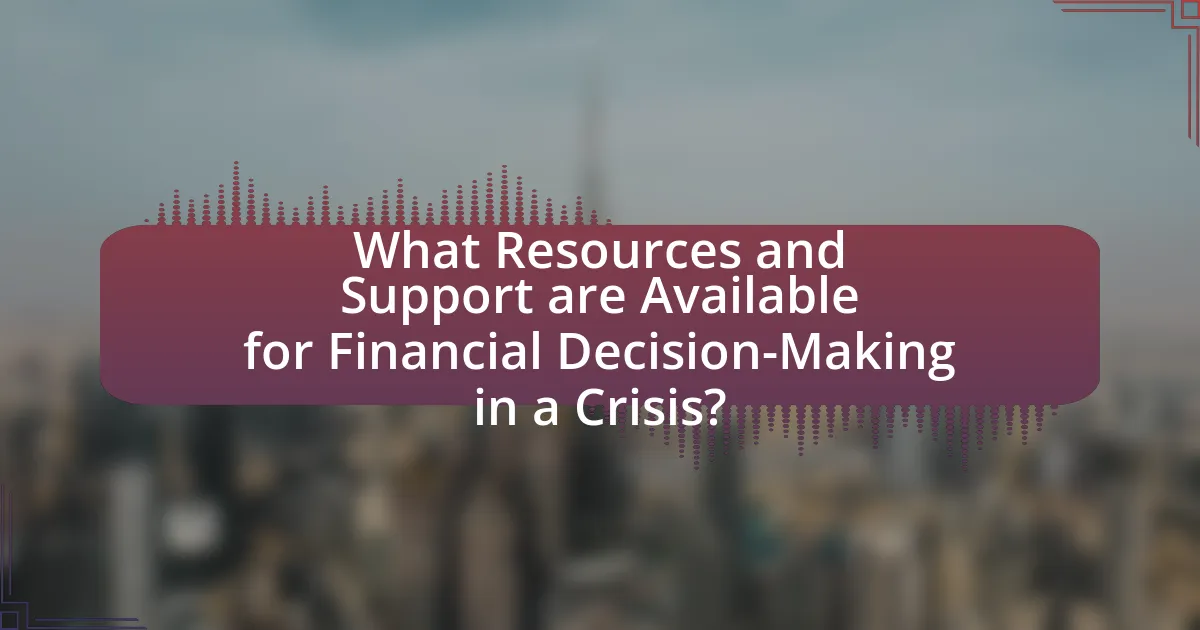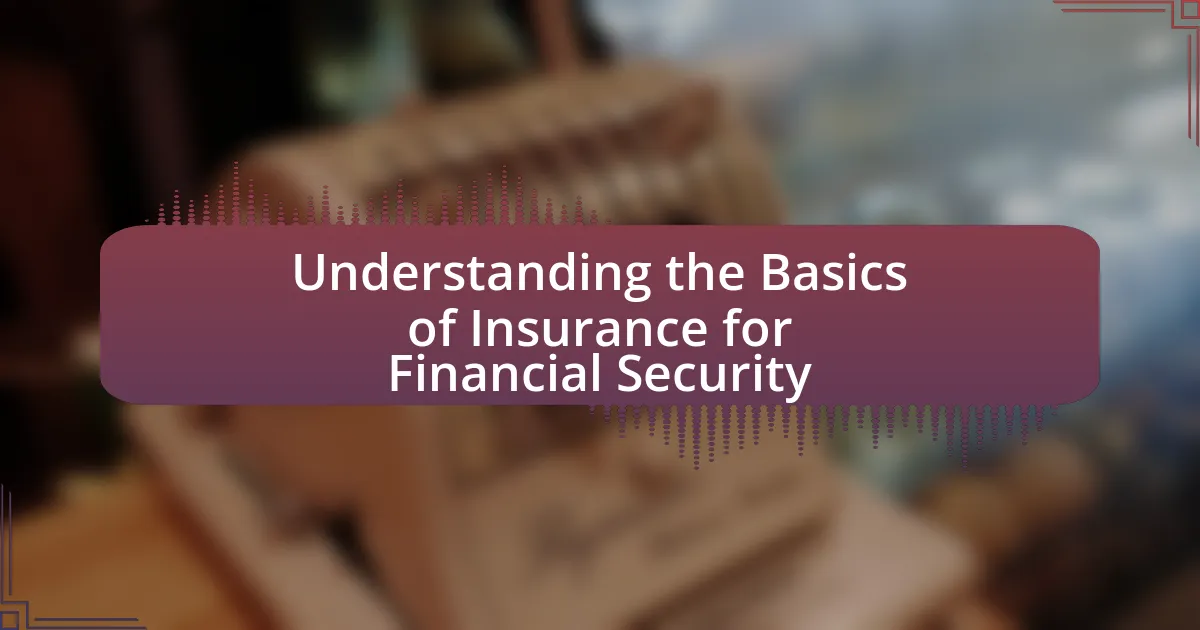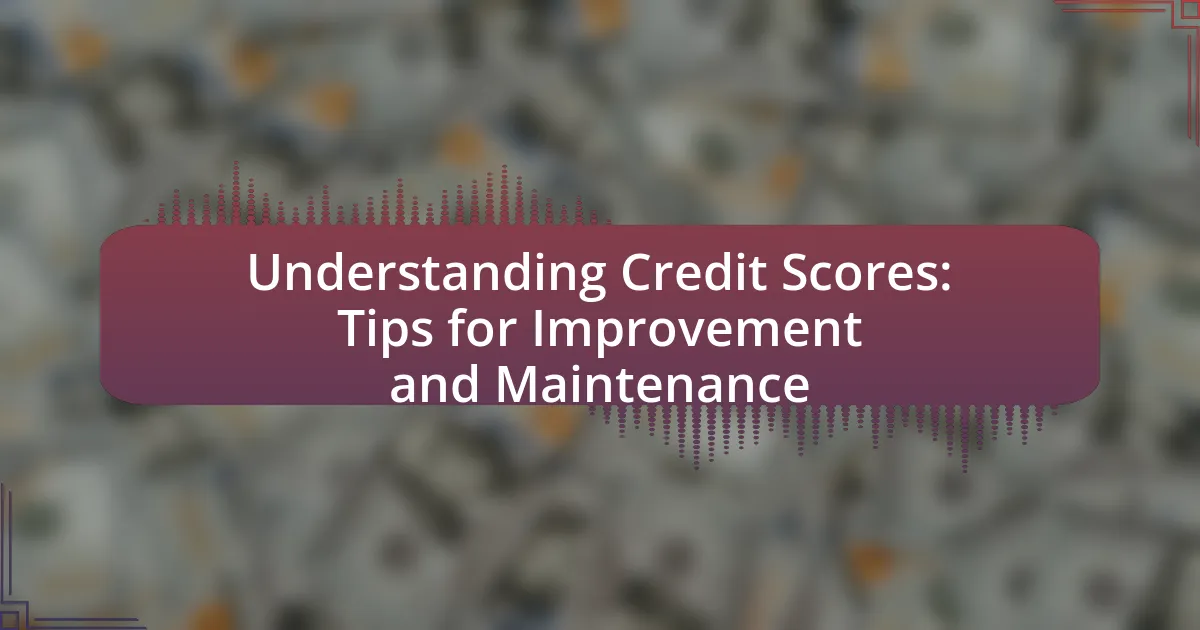The article focuses on making smart financial decisions during a crisis, emphasizing the importance of prioritizing essential expenses, building an emergency fund, and avoiding high-interest debt. It outlines key financial principles such as liquidity, cost management, and risk assessment, which guide effective decision-making. The article also highlights the significance of assessing one’s financial situation, avoiding common mistakes, and utilizing available resources and support, including financial counseling and government assistance programs. Practical tips for creating a financial action plan and maintaining stability during uncertain times are provided, ensuring individuals can navigate financial challenges effectively.

What are Smart Financial Decisions in a Crisis?
Smart financial decisions in a crisis include prioritizing essential expenses, building an emergency fund, and avoiding high-interest debt. Prioritizing essential expenses ensures that necessary bills, such as housing and utilities, are paid first, which helps maintain stability during uncertain times. Building an emergency fund, ideally covering three to six months of living expenses, provides a financial cushion that can be crucial when income is disrupted. Avoiding high-interest debt, such as credit card debt, prevents further financial strain and allows for better management of available resources. These strategies are supported by financial experts who emphasize the importance of maintaining liquidity and minimizing liabilities during economic downturns.
How can understanding financial principles help during a crisis?
Understanding financial principles helps during a crisis by enabling individuals and organizations to make informed decisions that mitigate risks and optimize resource allocation. For instance, knowledge of budgeting allows for prioritizing essential expenses, while understanding cash flow management aids in maintaining liquidity during downturns. Historical data shows that businesses with strong financial literacy are 30% more likely to survive economic crises, as they can adapt their strategies effectively. Additionally, familiarity with investment principles can guide individuals in making prudent choices, such as reallocating assets to safer options during market volatility.
What key financial principles should be prioritized in a crisis?
In a crisis, the key financial principles to prioritize are liquidity, cost management, and risk assessment. Liquidity ensures that an organization or individual has enough cash flow to meet immediate obligations, which is critical during uncertain times. Cost management involves reducing unnecessary expenses to preserve resources, allowing for better financial stability. Risk assessment focuses on identifying potential financial threats and developing strategies to mitigate them, ensuring long-term sustainability. These principles are essential as they help navigate financial challenges effectively, as evidenced by businesses that successfully adapted during the 2008 financial crisis by prioritizing these strategies.
How do these principles guide decision-making?
Principles guide decision-making by providing a framework for evaluating options and outcomes during financial crises. These principles, such as prioritizing essential expenses, assessing risk tolerance, and maintaining liquidity, help individuals and organizations make informed choices that align with their financial goals. For instance, prioritizing essential expenses ensures that critical needs are met first, which is crucial in a crisis where resources may be limited. Additionally, assessing risk tolerance allows decision-makers to understand their capacity for taking risks, which is vital when considering investments or expenditures during uncertain times. Maintaining liquidity ensures that sufficient cash flow is available to navigate unexpected challenges, reinforcing the importance of these principles in effective decision-making.
Why is it important to assess your financial situation during a crisis?
Assessing your financial situation during a crisis is crucial because it enables informed decision-making and prioritization of resources. Understanding your income, expenses, debts, and savings allows you to identify areas where you can cut costs or allocate funds effectively. For instance, a study by the Federal Reserve found that nearly 40% of Americans would struggle to cover a $400 emergency expense, highlighting the importance of financial awareness in crisis management. By evaluating your financial status, you can develop a strategic plan to navigate challenges, ensuring that essential needs are met while minimizing long-term financial damage.
What aspects of your financial situation should be evaluated?
Key aspects of your financial situation that should be evaluated include income, expenses, debts, savings, and investments. Evaluating income involves assessing all sources of revenue, including salary, bonuses, and passive income streams. Analyzing expenses requires a detailed review of fixed and variable costs to identify areas for potential savings. Debt evaluation focuses on outstanding liabilities, interest rates, and repayment terms to understand financial obligations. Savings assessment looks at emergency funds and other savings accounts to ensure adequate liquidity. Finally, investment evaluation involves reviewing asset allocation, performance, and risk exposure to align with financial goals. These evaluations provide a comprehensive overview of financial health, enabling informed decision-making during a crisis.
How can a financial assessment influence your decisions?
A financial assessment can significantly influence your decisions by providing a clear understanding of your current financial situation, including income, expenses, assets, and liabilities. This comprehensive overview allows individuals to identify areas for improvement, prioritize spending, and make informed choices about budgeting, saving, and investing. For instance, a study by the National Endowment for Financial Education found that individuals who conduct regular financial assessments are 50% more likely to achieve their financial goals compared to those who do not. This data underscores the importance of financial assessments in guiding effective decision-making during financial crises.
What common mistakes should be avoided when making financial decisions in a crisis?
Common mistakes to avoid when making financial decisions in a crisis include acting impulsively, neglecting to assess the full financial situation, and failing to seek professional advice. Acting impulsively can lead to hasty decisions that may worsen financial instability; for instance, selling investments at a loss during market downturns can lock in losses rather than allowing for potential recovery. Neglecting to assess the full financial situation can result in overlooking critical factors such as cash flow, debts, and emergency savings, which are essential for informed decision-making. Additionally, failing to seek professional advice can lead to missed opportunities for better financial strategies; research shows that individuals who consult financial advisors during crises often make more informed and beneficial decisions.
How can emotional responses impact financial choices?
Emotional responses significantly impact financial choices by influencing decision-making processes, often leading to irrational behaviors. For instance, fear can cause individuals to sell investments during market downturns, resulting in losses, while overconfidence may lead to excessive risk-taking in volatile markets. Research by the National Bureau of Economic Research indicates that emotions like fear and greed can distort financial judgment, leading to suboptimal investment strategies. This demonstrates that emotional states can override rational analysis, ultimately affecting financial outcomes.
What are the risks of impulsive financial decisions?
Impulsive financial decisions pose significant risks, including financial loss, increased debt, and long-term financial instability. When individuals make hasty choices without thorough analysis, they often overlook critical factors such as market conditions, personal financial situations, and potential consequences. For instance, a study by the National Endowment for Financial Education found that 70% of Americans have made impulsive purchases that they later regretted, highlighting the prevalence of regret and financial strain associated with such decisions. Additionally, impulsive spending can lead to accumulating credit card debt, which, according to the Federal Reserve, reached $930 billion in 2021, indicating a widespread issue that can jeopardize financial health.

How to Create a Financial Action Plan in a Crisis?
To create a financial action plan in a crisis, first assess your current financial situation by listing all income sources, expenses, debts, and savings. This comprehensive overview allows you to identify areas for immediate adjustment. Next, prioritize essential expenses such as housing, food, and healthcare while cutting non-essential spending. Establish an emergency budget that reflects these priorities, ensuring you can sustain yourself during the crisis. Additionally, explore alternative income sources, such as freelance work or government assistance programs, to bolster your financial stability. According to a 2020 report by the Federal Reserve, nearly 40% of Americans could not cover a $400 emergency expense, highlighting the importance of having a solid financial plan in place during uncertain times.
What steps should be taken to develop a financial action plan?
To develop a financial action plan, individuals should first assess their current financial situation by reviewing income, expenses, debts, and savings. This assessment provides a clear picture of financial health and identifies areas needing improvement. Next, individuals should set specific financial goals, such as saving for emergencies or paying off debt, which will guide their planning. Following goal setting, creating a budget that aligns with these goals is essential; this budget should detail how income will be allocated to various expenses and savings.
After establishing a budget, individuals should prioritize their financial goals, focusing on the most urgent needs first, such as high-interest debt repayment or building an emergency fund. Implementing the plan involves taking actionable steps, such as automating savings or adjusting spending habits to adhere to the budget. Finally, regular monitoring and adjusting of the financial action plan are crucial to ensure it remains effective and aligned with changing circumstances or goals. This iterative process helps maintain financial stability, especially during crises.
How do you prioritize expenses during a financial crisis?
To prioritize expenses during a financial crisis, focus on essential needs such as housing, food, healthcare, and utilities. These categories represent the most critical areas that directly impact survival and well-being. According to the U.S. Bureau of Labor Statistics, approximately 30% of household expenditures go towards housing, making it the top priority. Following housing, allocate funds for food, which accounts for about 10-15% of spending, and ensure healthcare costs are covered to avoid long-term financial repercussions. Lastly, utilities are necessary for maintaining a safe living environment. By categorizing expenses in this manner, individuals can effectively manage their limited resources during challenging financial times.
What strategies can be used to increase cash flow?
To increase cash flow, businesses can implement strategies such as optimizing accounts receivable, reducing expenses, and diversifying revenue streams. Optimizing accounts receivable involves shortening payment terms and actively following up on overdue invoices, which can lead to faster cash inflows. Reducing expenses can be achieved by identifying non-essential costs and renegotiating contracts with suppliers, thereby freeing up cash for operational needs. Diversifying revenue streams, such as introducing new products or services, can create additional income sources, enhancing overall cash flow stability. These strategies are supported by financial management principles that emphasize the importance of liquidity and operational efficiency in maintaining a healthy cash flow.
How can you effectively manage debt during a crisis?
To effectively manage debt during a crisis, prioritize essential expenses and communicate with creditors. By focusing on necessary costs such as housing, food, and healthcare, individuals can ensure their basic needs are met while minimizing discretionary spending. Additionally, reaching out to creditors to negotiate payment plans or deferments can provide temporary relief, as many lenders offer assistance during financial hardships. According to a survey by the National Foundation for Credit Counseling, 70% of creditors are willing to work with borrowers facing difficulties, highlighting the importance of proactive communication.
What options are available for debt relief or restructuring?
Debt relief or restructuring options include debt consolidation, negotiation with creditors, bankruptcy, and government assistance programs. Debt consolidation allows individuals to combine multiple debts into a single loan with a lower interest rate, simplifying payments. Negotiating with creditors can lead to reduced interest rates or settlement amounts, providing immediate financial relief. Bankruptcy, while a last resort, can discharge certain debts and offer a fresh start, though it has long-term credit implications. Government assistance programs may provide temporary relief through grants or deferments, helping individuals manage their financial obligations during crises. These options are supported by various financial institutions and legal frameworks designed to assist those in need.
How can you negotiate with creditors for better terms?
To negotiate with creditors for better terms, start by assessing your financial situation and determining what specific changes you need, such as lower interest rates or extended payment deadlines. Prepare a clear proposal that outlines your request and the reasons for it, emphasizing your willingness to pay and maintain a good relationship. Contact your creditors directly, ideally speaking to a representative who handles negotiations, and present your case calmly and confidently.
Research shows that creditors are often willing to negotiate, especially if they believe it increases the likelihood of receiving payment. According to a study by the National Foundation for Credit Counseling, 70% of consumers who attempted to negotiate with creditors reported success in obtaining better terms. This indicates that a well-prepared approach can lead to favorable outcomes.
What role does budgeting play in a financial action plan?
Budgeting is a critical component of a financial action plan as it provides a structured approach to managing income and expenses. By establishing a budget, individuals can allocate resources effectively, prioritize spending, and identify areas for savings, which is essential during a financial crisis. Research indicates that households with a budget are more likely to achieve their financial goals and maintain stability in challenging economic conditions, as they can track their financial health and make informed decisions.
How can you create a flexible budget that adapts to changing circumstances?
To create a flexible budget that adapts to changing circumstances, first establish a baseline budget that outlines fixed and variable expenses. This budget should include categories for essential costs, such as housing and utilities, as well as discretionary spending. Next, implement a system for regularly reviewing and adjusting the budget based on actual income and expenses, allowing for real-time modifications in response to financial changes. For instance, if income decreases, prioritize essential expenses and reduce discretionary spending accordingly. Research indicates that businesses using flexible budgeting can respond more effectively to market fluctuations, as evidenced by a study from the Journal of Business Research, which found that organizations with adaptable financial plans maintained better performance during economic downturns.
What tools can assist in tracking your budget effectively?
Budgeting tools such as Mint, YNAB (You Need A Budget), and Personal Capital can assist in tracking your budget effectively. Mint offers a user-friendly interface that aggregates all financial accounts, allowing users to categorize expenses and set budget goals. YNAB emphasizes proactive budgeting by encouraging users to allocate every dollar to specific expenses, which can lead to better financial awareness and control. Personal Capital combines budgeting with investment tracking, providing insights into both spending and long-term financial health. These tools are validated by their widespread use and positive user reviews, demonstrating their effectiveness in helping individuals manage their finances, especially during economic crises.

What Resources and Support are Available for Financial Decision-Making in a Crisis?
Resources and support for financial decision-making in a crisis include financial counseling services, government assistance programs, and online budgeting tools. Financial counseling services, often provided by non-profit organizations, offer personalized advice and strategies to manage finances effectively during difficult times. Government assistance programs, such as unemployment benefits and emergency relief funds, provide immediate financial support to individuals facing economic hardship. Additionally, online budgeting tools and apps help individuals track expenses, create budgets, and make informed financial decisions. These resources are essential for navigating financial challenges and ensuring stability during a crisis.
What types of financial assistance programs exist during a crisis?
Various types of financial assistance programs exist during a crisis, including government aid, nonprofit support, and private sector initiatives. Government aid often includes unemployment benefits, disaster relief funds, and stimulus payments, which are designed to provide immediate financial relief to individuals and families affected by economic downturns. Nonprofit organizations may offer grants, food assistance, and emergency loans to help those in need. Additionally, private sector initiatives, such as deferred loan payments and flexible payment plans, can provide temporary financial relief to consumers and businesses. These programs are critical in mitigating the financial impact of crises, as evidenced by the significant increase in unemployment claims and the establishment of emergency funds during events like the COVID-19 pandemic.
How can government programs provide relief to individuals and businesses?
Government programs can provide relief to individuals and businesses through financial assistance, tax relief, and support services. For instance, during economic downturns, programs like unemployment benefits help individuals maintain their income, while small business grants and loans, such as those offered through the Paycheck Protection Program, enable businesses to cover operational costs and retain employees. Historical data shows that during the COVID-19 pandemic, the U.S. government allocated over $2 trillion in relief funds, significantly aiding both individuals and businesses in navigating financial hardships.
What non-profit organizations offer financial counseling and support?
Non-profit organizations that offer financial counseling and support include the National Foundation for Credit Counseling (NFCC), which provides access to certified credit counselors and financial education resources. Another organization is the Financial Counseling Association of America (FCAA), which connects individuals with accredited financial counselors to assist with budgeting, debt management, and financial planning. Additionally, the United Way offers financial stability programs that include financial counseling services aimed at helping families achieve economic independence. These organizations are recognized for their commitment to improving financial literacy and providing essential support during financial crises.
How can professional financial advisors assist during a crisis?
Professional financial advisors assist during a crisis by providing tailored financial strategies that help clients navigate uncertainty. They analyze individual financial situations, recommend adjustments to budgets, and suggest investment reallocations to mitigate risks. For instance, during the 2008 financial crisis, advisors helped clients shift to more stable assets, which resulted in better preservation of capital. Their expertise in market trends and economic indicators enables clients to make informed decisions, ultimately leading to improved financial resilience in challenging times.
What should you look for when choosing a financial advisor?
When choosing a financial advisor, you should look for qualifications, experience, and fiduciary responsibility. Qualified financial advisors typically hold certifications such as Certified Financial Planner (CFP) or Chartered Financial Analyst (CFA), which indicate a level of expertise and adherence to ethical standards. Experience is crucial; advisors with a proven track record in managing finances during economic downturns can provide valuable insights. Additionally, fiduciary responsibility ensures that the advisor is legally obligated to act in your best interest, which is essential for trust and transparency in financial planning. According to a 2021 study by the CFA Institute, 75% of investors prefer working with fiduciary advisors, highlighting the importance of this aspect in advisor selection.
How can a financial advisor help you navigate complex decisions?
A financial advisor can help you navigate complex decisions by providing expert guidance tailored to your specific financial situation. They analyze your financial goals, risk tolerance, and market conditions to offer personalized strategies. For instance, during economic downturns, advisors can recommend asset allocation adjustments to mitigate risks and optimize returns. Research shows that individuals who work with financial advisors tend to achieve better financial outcomes, as they benefit from professional insights and disciplined investment approaches.
What practical tips can help you make smart financial decisions in a crisis?
To make smart financial decisions in a crisis, prioritize creating a budget that reflects your current financial situation. This involves tracking income and expenses to identify essential versus non-essential spending. Research indicates that individuals who maintain a budget during financial downturns are 30% more likely to manage their finances effectively. Additionally, build an emergency fund to cover at least three to six months of living expenses, as this provides a financial cushion during uncertain times. Studies show that having an emergency fund significantly reduces stress and improves decision-making. Lastly, avoid making impulsive financial decisions; instead, take time to evaluate options and seek advice from financial professionals when necessary. This approach can lead to more informed and beneficial outcomes during a crisis.
How can you stay informed about financial trends and resources?
To stay informed about financial trends and resources, regularly follow reputable financial news outlets, subscribe to industry newsletters, and utilize financial market analysis platforms. Reputable sources such as Bloomberg, The Wall Street Journal, and Financial Times provide timely updates and expert insights on market movements and economic indicators. Additionally, subscribing to newsletters from financial institutions or investment firms can deliver curated information directly to your inbox. Utilizing platforms like Yahoo Finance or Google Finance allows for real-time tracking of market trends and stock performance, ensuring access to the latest financial data.
What are the best practices for maintaining financial stability during uncertain times?
To maintain financial stability during uncertain times, individuals should prioritize building an emergency fund, reducing debt, and diversifying income sources. An emergency fund should ideally cover three to six months of living expenses, providing a financial cushion during unexpected events. Reducing debt minimizes financial obligations and interest payments, which is crucial when income may be unstable. Diversifying income sources, such as through side jobs or investments, can create additional revenue streams, reducing reliance on a single income source. According to a 2020 report by the Federal Reserve, nearly 40% of Americans would struggle to cover a $400 emergency expense, highlighting the importance of these practices in ensuring financial resilience.




